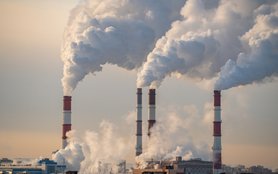The Security and Exchange Commission’s new rule on greenhouse gas emissions leaves investors and the planet unprotected.
Elected officials—Republicans in particular—and business interest groups are waging a fierce battle against investors who try to influence the behavior of companies around environmental, social, and governance (ESG) issues.
ESG IN THE CROSSHAIRS
Not a week goes by without news of a new anti-ESG investigation by elected officials against a bank or an asset manager, a new anti-ESG bill being introduced in Congress or at the state level, states taking the federal government or investors taking states to court, or states pulling public pension fund monies –funds that belong to nurses, teachers, firefighters, and other public servants—from legitimate investment vehicles. Since Republicans took over the House in 2022, the attacks have increased in intensity.
Investors have traditionally had opportunities to weigh in on ESG issues. From shareholder proposals on reducing harmful environmental and social impacts to investment funds that favor companies with strong ESG bona fides, they have used their voices and choices to press companies to clean up their acts. But now companies are taking aim at activists, and business groups are undermining government efforts to protect investor rights.
THE NEW SEC RULE: GUTTED
The latest casualty is the final rule from the Securities and Exchange Commission (SEC) on climate-related financial risks, which addresses disclosures around greenhouse gas (GHG) emissions. This guidance was long awaited. Oxfam provided extensive comments to the 2022 version of the rule, but in the end, the agency bowed to political and industry pressure and backtracked on many of its strongest provisions.
The proposed rule required disclosure of three kinds of emissions: direct emissions from company operations, indirect emissions that result from its energy consumption, and—if considered “material” or of financial relevance—emissions that occur along its value chain. The final rule eliminates the value chain from the picture altogether; so, for example, a company making beef products could report low GHG emissions by focusing only on its factory emissions and never taking responsibility for the climate cost of raising beef.
Under the final rule, larger companies may decline to disclose direct and indirect emissions if they claim they are not material. This is just one of the ways that the high-risk sectors of oil, gas, and agriculture can conceal their total emissions while touting progress. The opportunities for greenwashing abound.
Oxfam’s most recent climate assessment of global agribusiness companies noted that some companies disclose emissions for only some of their supply chains.
INSTITUTIONAL INVESTORS BACKING DOWN
The bad news gets worse. Many large institutional investors that had committed to reducing emissions in their portfolios have watered down their climate commitments. The latest to bow to pressure last month were JP Morgan Chase and State Street Global Advisors, which have exited the Climate Action 100+ network. Also in February, Bank of America reneged on its 2022 commitment to stop financing new coal mines, coal-burning power plants, and Arctic drilling projects. BlackRock, the largest global asset manager, has toned down its rhetoric on ESG, which represents a big departure from the last few years.
Elsewhere, businesses and business groups are pulling out all the stops against ESG. Business groups are suing California for introducing legislation that would require companies to disclose climate-related risks. And as part of an effort to curtail shareholder rights, ExxonMobil has taken two legitimate shareholders to court—a move that sets a dangerous precedent.
The picture could not be clearer: big business is trying to silence everyone—individuals, investors, activists, and more—who might challenge its right to earn profits at any cost. It’s willing to contribute to inequality and the destruction of the planet as long as its executives get to live a Gilded-Age existence. And as the latest SEC ruling illustrates, the government is failing to curb its power.
WHAT’S AT STAKE: JUST ABOUT EVERYTHING
Shutting down avenues for input from those who can hold big companies accountable for their actions has the potential to affect the ability of average people to earn a living wage, afford healthcare and daycare, work in safe conditions, and pursue economic equality across race, gender, and class. And the unfettered pursuit of corporate profits will trigger further global warming and the catastrophic storms, wildfires, floods, droughts, and pandemics that accompany it—events that will both endanger lives and sharply intensify poverty and inequality.
There is no time to waste. Inequality and climate change represent the two greatest risks of our time. It is up to all of us—as voters, constituents, customers, employees, citizens, and investors—to vote with our voices, our purchases and investments, and our ballots to challenge companies and policy makers who are prioritizing power and profits over people and the planet.



